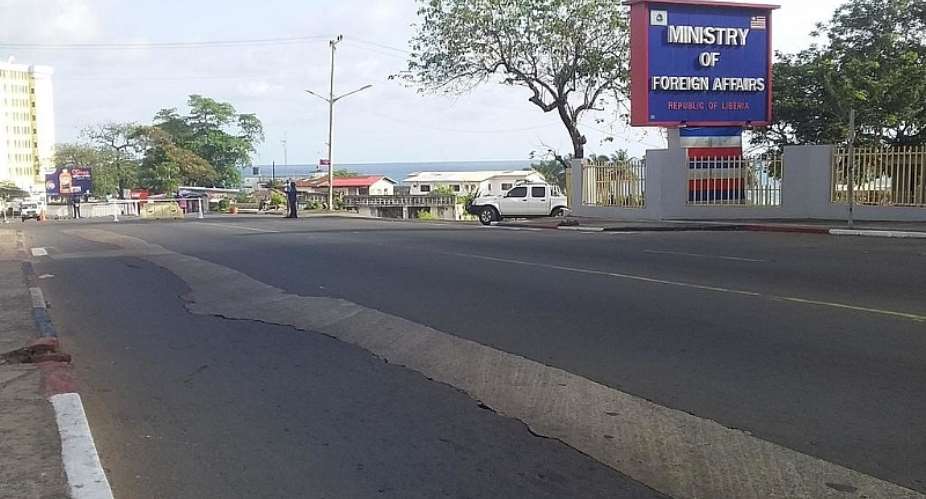With 76 confirmed cases of Covid-19 and seven deaths, the Liberian legislature has approved President George Weah's request to declare a state of emergency to contain the further spread of the virus. But MPs insisted on provisions to ensure transparency of the money earmarked to help Liberians.
Weah had earlier written to the legislature requesting its concurrence to impose a state of emergency and declare a 21-day lockdown.
The 60-day state of emergency is aimed at helping healthcare workers locate sick people and respond to cases promptly, measures that were put in place throughout the country during the Ebola epidemic from 2014-12016.
Lawmakers approved the lockdown and quarantine imposed by Weah, but added that anyone “appearing in public streets and buildings must wear a protective device that covers at least the nose and mouth,” according to the joint resolution.
Based on the advice of health experts, the senators also imposed a quarantine in the affected counties.
Controversy over stimulus plans
Weah sought legislative approval to allocate 23 million euros for food distribution to households in counties affected by Covid-19, but in a letter to the legislature, he said the budget could go up to 37 million euros.
“The World Bank has agreed to finance this gap off-budget to the tune of nine million euros, using resources reallocated from existing projects,” Weah wrote.
But during legislative deliberations which lasted for nearly three days, several lawmakers, including Edwin Melvin Snowe Jr, of Bomi County District #1, questioned granting exclusive powers to appointed public officials implementing the stimulus package due to fear of corruption.
“About a year ago, we had $25 million mop-up exercise; today, we are still discussing the outcome of the $25 million mop-up. We are now talking about infusing another $25 million,” Snowe said, referring to money that was intended to cover excess Liberian dollars that were in the market.
In February 2018, an investigative report by Kroll Associates, an international auditing firm hired by United States Agency for International Development (USAID) outlined discrepancies and recommended a full-scale forensic audit of disbursements from the Central Bank of Liberia for the period January 2016 to December 2018.
Months later, the General Auditing Commission (GAC) submitted its report after being directed by the president to investigate the missing money.
After the GAC report was submitted, the government also mandated the Liberia Anti-Corruption Commission (LACC) to conduct another investigation into the mop-up exercise. To date findings of that report is yet to be made public.
Reaching a compromise
Reacting to the lawmaker's concerns, acting Senate President Albert Chie said a joint Emergency Oversight Committee will be put together by both the Speaker of the House of Representatives and himself to exercise oversight over all of the programmes to ensure transparency.
Chie said the 23 million euros would be earmarked to support food distribution, prioritising vulnerable people such as disadvantaged youths, homeless, orphans, senior citizens, healthcare workers and security on the frontline.
Free water and electricity will be supplied to households during the 60-day period, Chie added, stressing that the measures are intended to alleviate hardship.
Special bank loans
Weah told the legislature that market women and informal petty traders with loans will be the ones who suffer significantly during the stay at home order.
He proposed that the government repay their loans in full, as part of the requested budgetary reallocation.
“All health workers shall receive monthly hazard pay for regular as well as volunteer workers as provided for by international organisations,” according to the joint resolution.
Speaking to RFI in downtown Monrovia, a number of street sellers with loans welcomed the gesture by the government.
“I am just appealing to those who will be in charge of this process to please ensure the real beneficiary can benefit,” said Ernest Ojuku, 40, a used clothing seller. He said he is worried the money might get in the wrong hands if not monitored.
“We don't want to see a reoccurrence of the mop-up money. I am warning them to implement this exercise as the president's desire – especially for us that are suffering,” he added.
Ojuku is among several small business people whose market tables were destroyed by the government in the commercial hub of Waterside in order to decongest the city and limit the spread of the coronavirus.





 Akufo-Addo commissions Phase II of Kaleo solar power plant
Akufo-Addo commissions Phase II of Kaleo solar power plant
 NDC panics over Bawumia’s visit to Pope Francis
NDC panics over Bawumia’s visit to Pope Francis
 EC blasts Mahama over “false” claims on recruitment of Returning Officers
EC blasts Mahama over “false” claims on recruitment of Returning Officers
 Lands Minister gives ultimatum to Future Global Resources to revamp Prestea/Bogo...
Lands Minister gives ultimatum to Future Global Resources to revamp Prestea/Bogo...
 Wa Naa appeals to Akufo-Addo to audit state lands in Wa
Wa Naa appeals to Akufo-Addo to audit state lands in Wa
 Prof Opoku-Agyemang misunderstood Bawumia’s ‘driver mate’ analogy – Miracles Abo...
Prof Opoku-Agyemang misunderstood Bawumia’s ‘driver mate’ analogy – Miracles Abo...
 EU confident Ghana will not sign Anti-LGBTQI Bill
EU confident Ghana will not sign Anti-LGBTQI Bill
 Suspend implementation of Planting for Food and Jobs for 2024 - Stakeholders
Suspend implementation of Planting for Food and Jobs for 2024 - Stakeholders
 Tema West Municipal Assembly gets Ghana's First Female Aircraft Marshaller as ne...
Tema West Municipal Assembly gets Ghana's First Female Aircraft Marshaller as ne...
 Dumsor is affecting us double, release timetable – Disability Federation to ECG
Dumsor is affecting us double, release timetable – Disability Federation to ECG
